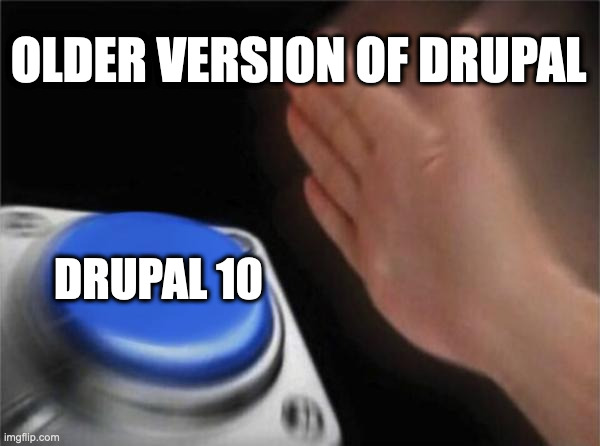News
Please join us for the Moodle Academy “What’s New in Moodle 4.1” webinar on Thursday 15 December 2022, 12:00 UTC
Please join us for the Moodle Academy “What’s New in Moodle 4.1” webinar on Thursday 15 December 2022, 12:00-13:00 UTC.
In this webinar you will learn about the new features and improvements for all users in Moodle LMS 4.1.
The webinar is suitable for anyone who is already familiar with Moodle.
What’s happening with proxy blocks?
Drupal Association blog: Join us for 10 Days of Drupal 10!
Drupal 10 is almost here, and we cannot wait for the community to experience the latest version of Drupal! With an expected release date of 14 December, we have less than two weeks to go. The Drupal Association is hosting 10 Days of Drupal 10 giveaways in celebration of the release!
From 5 December to 14 December, tag us daily on Twitter with a Drupal 10-themed meme or graphic for the chance to WIN an exclusive Drupal 10 hoodie. Your Drupal 10 meme or graphic can be highlighting one of your favorite Drupal 10 features, upgrades, or anything else related to Drupal 10.
Here are some examples for inspiration:


Then, on #Drupal10’s expected release day, 14 December, we’re giving two lucky winners a chance to win a ticket to DrupalCon Lille or DrupalCon Pittsburgh (your choice!). To win, all you have to do is tag us with a video of your Drupal 10 release party. After that, we’ll randomly choose two winners to receive one ticket each.
We want to see how you celebrate the release, so feel free to get creative and show us your celebration. We can’t wait to see all of your videos!
On Monday, 5 December, head to the Drupal Association Twitter account, @DrupalAssoc, for the kickoff of 10 Days of Drupal 10 and your chance to win! In the meantime, check out the new features on the Drupal 10 page. The Drupal 10 page also contains all the information you’ll need to ensure a smooth upgrade to Drupal 10.
Are you hosting a Drupal 10 party in celebration of the release? Share it with the community by adding it to the Community Events page on Drupal org!
Help the OpenBSD Foundation Reach Its 2022 Funding Goal
At the time of writing, the amount raised in 2022 stands at a little over 50% of the stated goal.
The Foundation needs your help to sustainably fund the project. Please head over to the Foundation’s donations page, and make sure you drag your employer over there too!
With about 30 days left in 2022, we know we can do it!
Troubleshoot node connectivity issues in Ansible Automation Platform controller
Check connectivity to hosts you’re managing with your AAP controller and get a spreadsheet-based summary of any exceptions. Read More at Enable Sysadmin
The post Troubleshoot node connectivity issues in Ansible Automation Platform controller appeared first on Linux.com.
Pulse Joins the Mozilla Family to Help Develop a New Approach to Machine Learning
I’m proud to announce that we have acquired Pulse, an incredible team that has developed some truly novel machine learning approaches to help streamline the digital workplace. The products that Raj, Jag, Rolf, and team have built are a great demonstration of their creativity and skill, and we’re incredibly excited to bring their expertise into […]
The post Pulse Joins the Mozilla Family to Help Develop a New Approach to Machine Learning appeared first on The Mozilla Blog.
FSF Blogs: November GNU Spotlight with Amin Bandali: Fifteen new GNU releases!
Author: Source Read more
Memory safe languages in Android 13
Money Order To Sister For ‘Sabitri Brata’ Took 4 Years To Reach 100 km In Odisha
Argus News is Odisha’s fastest-growing news channel having its presence on satellite TV and various web platforms. Watch the latest news updates LIVE on matters related to politics, sports, gadgets, business, entertainment, and more. Argus News is setting new standards for journalism through its differentiated programming, philosophy, and tagline ‘Satyara Sandhana’.
To stay updated on-the-go,
Visit Our Official Website: www.argusnews.in
iOS App: http://bit.ly/ArgusNewsiOSApp
Android App: http://bit.ly/ArgusNewsAndroidApp
Live TV: https://argusnews.in/live-tv/
Facebook: https://www.facebook.com/argusnews.in
YouTube: www.youtube.com/c/TheArgusNewsOdia
Twitter: https://twitter.com/ArgusNews_in
Instagram: https://www.instagram.com/argusnewsin
Argus News Is Available on:
TataPlay channel No – 1780
Airtel TV channel No – 609
Dish TV channel No – 1369
d2h channel No – 1757
SITI Networks – 18
Hathway – 732
GTPL KCBPL – 713
& other Leading Cable Networks please visit https://argusnews.in/channel_number for channel number list
You Can WhatsApp Us Your News On- 8480612900
#ArgusEnglish #ArgusNews #indianpost #sabitribrata #moneyorder


_0.png)